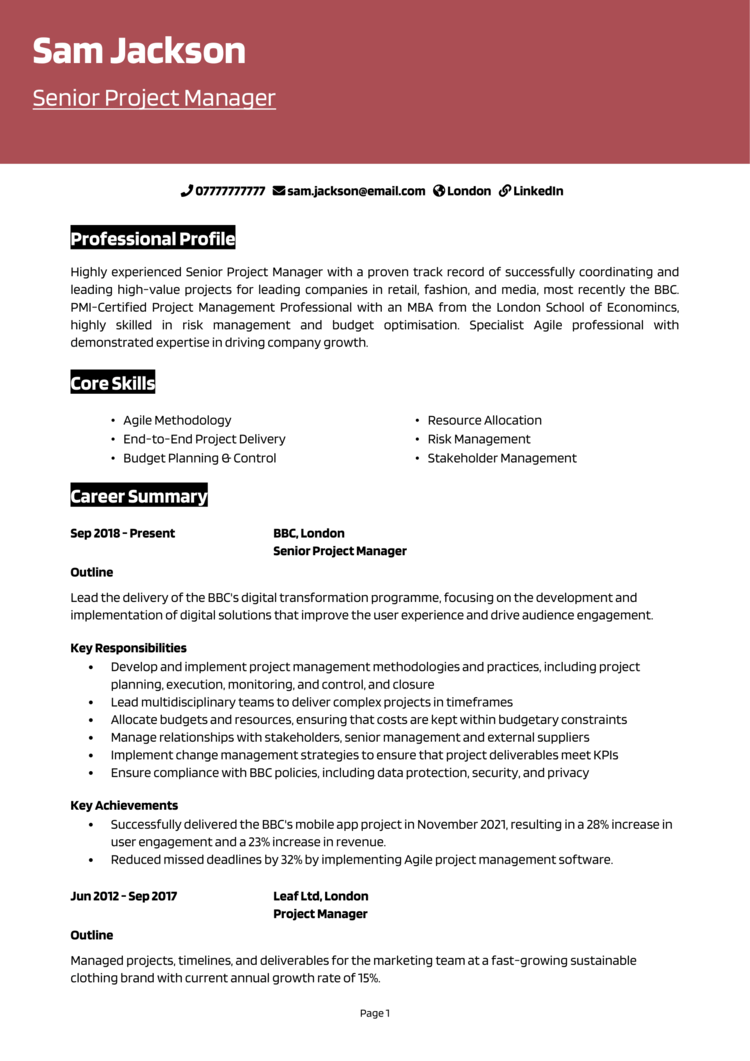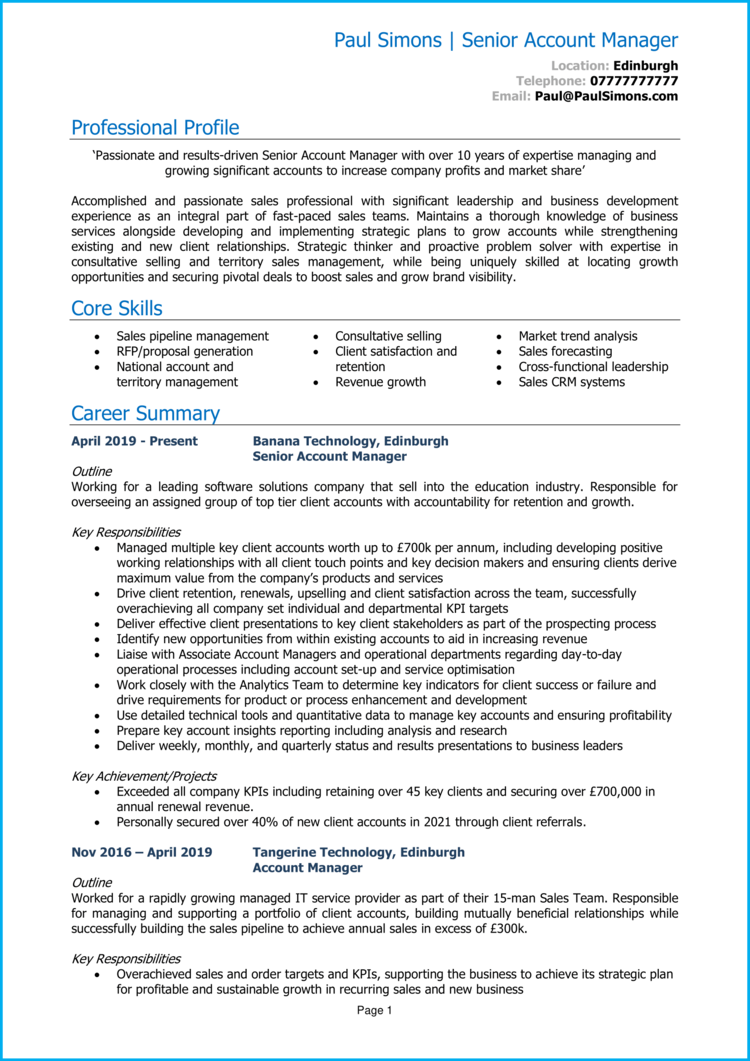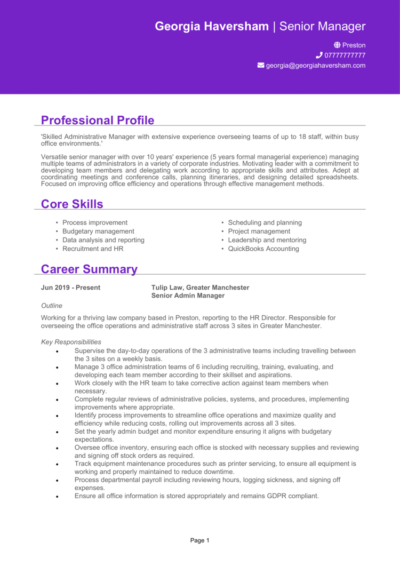When you’re at senior level, results matter – but so does how you present them. From driving growth to leading transformation, your achievements as a senior manager deserve more than just a passing mention.
You’ve already climbed the ladder: this guide and its Senior Manager CV examples will make sure your efforts aren’t wasted. A good CV will make sure your next employer sees not just what you’ve done, but why you’re the one to lead what comes next.
Senior Admin Manager CV

Senior Project Manager CV

Senior Account Manager CV

Senior Brand Manager CV

How to write your Senior Manager CV
Discover how to craft a winning Senior Manager CV that lands interviews with this simple step-by-step guide.
Writing a CV isn’t about listing responsibilities (if it was, this’d be too easy for you). It’s about clearly showing where you’ve made an impact and how you’ve driven meaningful change.
This guide will help position you as a senior leader worth investing in – presenting your experience, leadership strengths, and outcomes in a way that’s sharp and tailored to executive expectations.
Senior Manager CV format and structure guidelines


If your layout looks like a scrambled org chart, don’t expect anyone to read past line one. Your approach of planning, prioritising, and executing effectively should apply to your CV. A clear structure helps employers grasp your journey and the scale of your contributions with minimal effort. A CV which is already too hard to read really isn’t worth a recruiters’ effort: so make sure they stick around.
Here’s the structure to follow:
- Name and contact details – Place this personal info at the top so employers can get in touch easily.
- Profile – Give a brief overview of your leadership background, focus areas, and sector experience.
- Core skills – Write a concise list of your key strengths and strategic abilities.
- Work experience – List your previous roles in reverse chronological order, with your most recent first.
- Education & certifications – Go through the academic history which underpins your expertise, like degrees and training courses.
- Additional info –This optional section can include professional memberships, awards, or hobbies and interests that showcase your fit for the role.
Start by dividing your CV into clearly labelled sections so the reader can navigate with ease – think of it like setting a clear agenda for a board meeting. Use a professional, legible font to maintain a polished, business-ready look, and break down your content into concise bullet points to avoid overwhelming the page.
Aim for a maximum of two pages, allowing you the length to showcase your leadership history without losing focus. This format which makes use of these tips will reinforce your ability to communicate effectively – something every great senior manager needs to demonstrate from the first glance.
Creating a strong Senior Manager profile


Your CV profile is your executive summary. It should introduce you as an experienced leader with a proven track record and a strategic mindset. Whether you’ve overseen departments, projects, or whole business units, make it clear what kind of leader you are and what kind of value you bring.
Senior Manager CV profile examples
Profile 1
Strategic and results-driven Senior Manager with over ten years of experience leading cross-functional teams and driving performance across operations, finance, and service delivery. Proven track record in business transformation, stakeholder engagement, and implementing efficiency initiatives. Skilled in project management, budgeting, and team development. Known for delivering high-impact outcomes in complex, fast-paced environments.
Profile 2
Experienced Senior Manager with a strong background in leading teams, overseeing large-scale projects, and achieving organisational goals across corporate and public sector settings. Adept at managing change, aligning operations with strategic objectives, and building strong internal and external relationships. Brings excellent leadership, analytical thinking, and commercial insight to every challenge.
Profile 3
Dynamic and forward-thinking Senior Manager with 12 years of experience in managing high-performing departments across technology, retail, and professional services. Skilled in mentoring, setting KPIs, and delivering sustainable growth. Experienced in working at board level and collaborating with stakeholders to influence business direction and support long-term planning.
Details to put in your Senior Manager CV profile
Here’s what to include in your CV profile:
- Where you’ve worked – Mention industries or companies that give context to your experience.
- Your top qualifications – Note leadership training, advanced degrees, or specialist knowledge.
- Essential skills – Include the type of oversight you’ve provided – people, budgets, strategy.
- Leadership focus – Highlight what you specialise in: growth, restructuring, stakeholder management, etc.
- Impact – Give a sense of scale – whether it’s the size of your team or the revenue you influenced.
Show off the core skills recruiters look for


At this level, your skills aren’t just tools – they’re the reason the whole machine keeps running. This section lets recruiters instantly see the strengths you bring to senior roles. Focus on leadership capabilities and operational insights relevant to your target roles.
Make sure your skills reflect the seniority of the position – think beyond daily tasks and highlight what sets your leadership apart. And remember: it’s not about quantity, it’s about relevance.
Most important skills for a Senior Manager
- Strategic Leadership – Setting long-term goals, aligning departmental objectives with company vision, and driving organisational growth.
- Team Management and Development – Leading cross-functional teams, mentoring staff, and fostering a high-performance work culture.
- Operational Oversight – Overseeing daily operations, streamlining processes, and ensuring delivery of high-quality outcomes.
- Budget and Resource Allocation – Managing departmental budgets, controlling costs, and optimising use of resources to meet targets.
- Stakeholder Communication – Liaising with executives, clients, and internal teams to communicate goals, performance, and strategic updates.
- Performance Monitoring and Reporting – Defining KPIs, evaluating departmental results, and implementing corrective actions where necessary.
- Change Management – Leading transformation projects, implementing new systems or processes, and guiding teams through organisational change.
- Risk Management and Compliance – Identifying business risks, ensuring regulatory compliance, and developing mitigation strategies.
- Project Leadership – Overseeing large-scale initiatives from planning through to execution, ensuring timely and successful delivery.
- Business Development Support – Contributing to market expansion, partnership building, and revenue growth through strategic input.
Describing your work experience


At senior level, employers don’t just want to see where you’ve worked – they want to understand your leadership style, your approach to challenges, and your track record of delivering genuine value. Use this section to outline what you were responsible for and your impressive achievements.
List your work experience in reverse chronological order. For each role, include your job title, company, and dates. Then break it down into bullet points showing the teams you led, budgets you managed, strategic goals you set, and improvements you delivered.
What’s the correct way to structure job history on your CV?

- Outline – Describe the organisation, your level of responsibility, and the business context.
- Responsibilities – Use action words like “led,” “delivered,” “restructured,” or “accelerated” to describe how you drove performance.
- Achievements – Back up your impact with results: “Increased operational efficiency by 22%,” “Delivered £1.3m cost savings through supply chain overhaul,” or “Grew team from 15 to 45 to support national expansion.”
Sample work experience for Senior Managers
Senior Manager | Grayline Consulting Group
Outline
Led business operations and client delivery for a mid-sized consultancy, managing departmental strategy, performance targets, and staff development across multiple service lines.
Responsibilities
- Oversaw a team of 30 consultants and analysts across three business units.
- Developed annual operational plans and monitored delivery against strategic goals.
- Implemented new reporting frameworks and KPIs to improve transparency and accountability.
- Managed client relationships, proposals, and delivery timelines on key accounts.
- Coached and mentored team leads, supporting professional development and succession planning.
Achievements
- Increased team productivity by 25% through workflow optimisation and clearer accountability.
- Secured £1.2M in new contracts through strong relationship management and proposal leadership.
- Reduced staff turnover by 35% by introducing a structured development and feedback programme.
Senior Manager | Westridge Retail Group
Outline
Directed regional retail operations for a national high-street brand, leading commercial strategy, staff performance, and sales growth across 40+ store locations.
Responsibilities
- Managed profit and loss accountability for regional sales exceeding £30M annually.
- Led a team of regional and area managers, overseeing recruitment, training, and performance.
- Analysed sales trends and implemented targeted strategies to boost revenue and reduce costs.
- Collaborated with marketing, supply chain, and head office teams to execute promotions.
- Ensured full compliance with H&S, HR, and operational policies across all locations.
Achievements
- Achieved a 12% year-on-year increase in regional sales through targeted growth initiatives.
- Introduced a new leadership training scheme that improved store manager retention.
- Consistently ranked top-performing region for customer satisfaction over two consecutive years.
Senior Manager | Lunaris Tech Ltd
Outline
Managed delivery operations and technical project portfolios for a growing SaaS provider, supporting digital transformation and client satisfaction.
Responsibilities
- Oversaw project delivery teams and coordinated development cycles across client accounts.
- Established delivery processes and SLAs to ensure consistent, high-quality outcomes.
- Worked closely with product and engineering leads to align project scope and timelines.
- Monitored budget, resource allocation, and profitability across all major projects.
- Acted as escalation point for client concerns, ensuring timely issue resolution.
Achievements
- Improved project delivery rate by 30% within 12 months through new process implementation.
- Led client onboarding programme that reduced time-to-value by 40%.
- Recognised by senior leadership for driving operational excellence across the delivery team.
What should your CV’s education section include?


Senior managers are expected to have both experience and a strong foundation of formal training. Use this section to list degrees, industry certifications, and leadership development programmes. That said, your education section should be kept pretty brief: the priority is heavily on your experience and the value you’ve delivered.
Include postgraduate qualifications (e.g. MBAs), strategy or finance training, and any CPD that shows your commitment to growing as a leader. Executive programmes from recognised institutions are especially worth highlighting.
What qualifications do employers look for in a Senior Manager?
- MBA or Executive MBA – Offers advanced strategic, operational, and financial training.
- Postgraduate Diploma in Leadership & Management (CMI/ILM) – Formalises your leadership capability.
- PRINCE2 or PMP Certification – Especially useful for senior managers in project-heavy environments.
- Lean Six Sigma (Black Belt/Green Belt) – Ideal for performance and process improvement.
- Finance for Non-Financial Managers (Short Course) – Great for non-finance leaders with P&L oversight.





